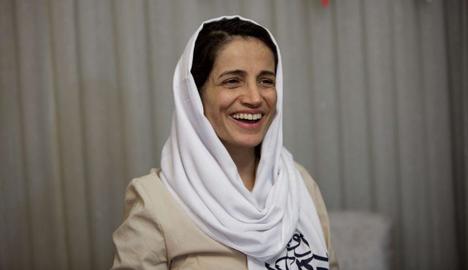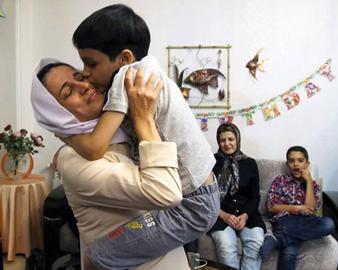
On Wednesday night, the government of Iran surprised the world by releasing a number of prominent political prisoners on the eve of the United Nations General Assembly. The gesture prompted widespread jubilation amongst prisoners' families, and marks an unexpected and significant move by President Hassan Rouhani to deliver on one of his most delicate campaign promises. But news around precisely who has been released and under what circumstances remains murky. We spoke to Drewery Dyke of Amnesty International, who has been following the case closely, to clarify where things stand legally with the released prisoners, and what this might portend for the Rouhani government's focus on human rights.
To start with, can you tell us how many prisoners you can confirm have been released?
Eleven as of yesterday but there were so many rumors late last night. Nasrine [Sotoudeh] told us that there were 20 prisoners in her ward in the morning, and that three others had been released. But there were 20 more whom she indicated were prisoners of conscience in with her, a couple of prominent political figures. But the rumors last night included Ahmad Zeidabadi and some of the students. But as of late last night there were denials and pleas for clarification. It’s hard to see that there is going to be many more.
There are were no conditions imposed, and I hate to say this, but it is a bit of a concern. I don’t like acts that appear arbitrary, even if they when they are good. You need them to have a reason and follow a procedure. Prisoners can put in for a conditional release when they have served half or more than half of their time. This is for example the case with the lawyer Houtan Kian who is the lawyer for Sakineh Ashtiani. He put in for his release and he is now out. This is our main shortage of where our information is coming from, we’ve been asking about Saeed Metinpour, the Azerbaijani rights activist, and other rights activists from the minorities about what's happened to them. But there seems to be no movement.
So it's not entirely clear what the legal standing is around these releases? In the case of Nasrin Sotoudeh, for example, her sentence has not been overturned, correct?
Yes that’s exactly it, and that’s the kind of concern that we would have. Of course the authorities would say that the conviction for her stands, I suppose after the fact they could depict it as a kind of conditional early release, although nothing along those lines was said to her in the car. That category of early release would be borderline in the case of her sentence. But as with all these things, it's not clear whether it is the beginning of a process or the tail end of it. For us, [it is important that] there be processes which are transparent, which go through visibly logical procedures that are going to arrive in reason, rather that an act of arbitrariness, 'Get in the car, go home.' That’s great, but what comes next?
Some of the comments Sotoudeh has made to various media outlets seem to reflect exactly that sentiment. She is in a delicate position and perhaps it’s difficult for her to articulate that, but to be put in a car and sent home with no warning nor legal clarification about your standing – it actually highlights everything that is problematic with the judicial process that she's been through, right?
Absolutely. As I said, I haven’t spoken to some of [the released prisoners] but they have indicated that it a conditional release (azaadiy-e mashroot), which I take to mean that the same sort of procedure that was taken by Houtan Kian. The people I’ve spoken to who have spoken with him say [he was released in this manner] and at least it was a recognized procedure. A procedure where the prisoner writes an request to the administrators of the prison, they process it and the prisoner is either out or not out. That’s an understandable procedure.
So this is arbitrary?
This looks like window dressing or autumn cleaning as the president prepares his bags to head off to the UN General Assembly in New York. Coming with carrier luggage with of a whole bunch of good news. And if that is the case, that is something that we would be very concerned about. As we said yesterday, we want to see the kind of acts that mark a fundamental turning point in the human rights discourse in Iran. And what I’m trying to say and trying to convey to the people in charge is that they should be engaging in dialogue. In fact they should be entering into a dialogue with these people who are still detained, to get a measure of where the human rights discourse should be going. There is such a suppressed thirst, it really needs to be addressed. And I think that there are signs that it’s being addressed.
So this is both politically calculating, but also very positive, in the context of where Iran stands on these issues and President Rouhani fulfilling a campaign promise. How do you balance those understandings?
It’s a work in progress. I guess when President Rouhani was elected, we said here is a bunch of things you can look at. We are focusing this not necessarily on [Rouhani] as president, because in human rights or the administration of justice the president has got very little purchase on the acts or what the judiciary does. But at the same time, there is a mood music and strength to the mandate and the position of the individual elected and the overall context of what’s going, that we felt that it couldn’t be ignored. And therefore we took seriously these hints, promises and indications that though these things were not really in his sphere that they would get addressed. And some of them are getting addressed, but as I said, this is a work in progress.
What else should we be looking for, as signs of further real intention by the Rouhani government?
I guess what we would like to see is how the new government plans to go forth. For example, are they going to work with parliament to get mass participation around the discussion on the bill defining political crimes? I think that’s an area that the new government could make a proper contribution to ending the forms of arbitrary arrest, arbitrary detention, arbitrary in the sense that those acts – freedom of expression, freedom of assembly – have no basis in international criminal law.
The new government could, with the minister of justice, initiate discussions with the Judiciary, looking at the condition of the Revolutionary Court per se. I know these are issues that lawyers like Nasrin Sotoudeh are interested in. The code of criminal procedures is under discussion. We had an unfortunate turn of events with the ratification of the penal code earlier this year by outgoing president Mahmoud Ahmadinejad. So with the code of criminal procedure there is an opportunity now to work with parliament, to work the judiciary to ensure that there is one key point: that people should have a right to a lawyer from the time of arrest, and not be subjected to the judge of the file.
It’s true that the president doesn’t have or the government doesn’t have a look-in a sort of conventional way in the workings of the judiciary, but around the overall discourse of human rights, they can still do an awful lot. That’s how I read these so called promises that Rouhani made from before. But as I said, it’s a work in progress and we would like to see now that there's all this activity before he goes to New York, something that shows that you guys you are serious about making these durable, lasting changes.
Do you think all of this will resonate in the United States as the Rouhani government presumably intended it to? The U.S. Congress invokes human rights every time it passes new sanctions, so surely this will disarming, to some extent?
I think it will, these are smart moves. It’s undeniable the timing will resonate particularly with countries in the global south who have been sensitive to the single minded opprobrium cast upon Iran. I think there have been some concern about that. This will certainly meet their critics. But I guess what we would say to them is actually the same thing. Just wait, let’s see how secure and embedded these changes are going to be before jumping into conclusions.
We have to welcome it and we have to turn our minds to the next step, because we've had eight to nine years of pretty difficult living. The past four years really have been comprehensively negative, I regret to say. And the practice of torture, the place of the death penalty in the country, assembly and association issues, they all have to be tackled one by one. The government has got an opportunity to do this now. These are some hopeful, positive signs that some of the stuff will change. But we are all looking for that fundamental shift change that's going to set these movements in stone.
visit the accountability section
In this section of Iran Wire, you can contact the officials and launch your campaign for various problems























comments